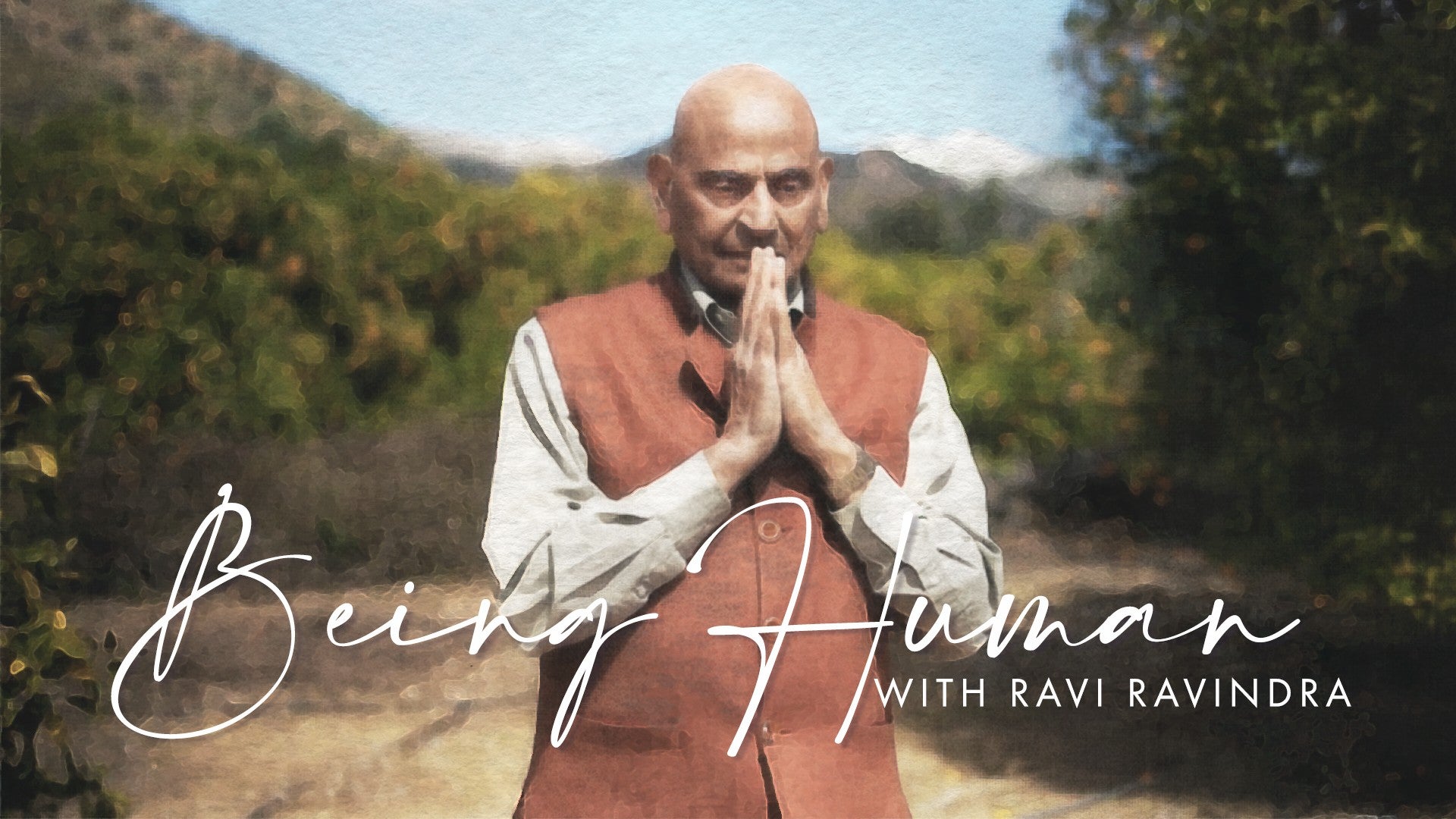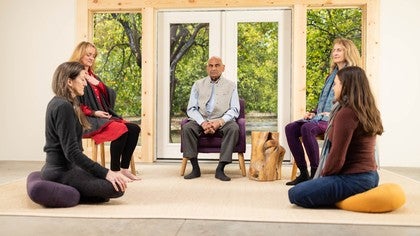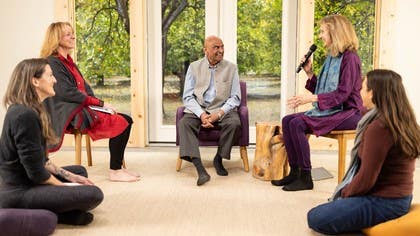Description
About This Video
Transcript
Read Full Transcript
Well, Ravaji, I have a question for you. And the first day in what you shared with us, you mentioned that the best way to handle being under attack or being affected by a negative person or even a demonic person was to develop compassion towards them. And my question is how can I, or especially in terms of what's going on in our family, I, we're facing up against some problems, some big problems. And so I'm wondering how to develop compassion while I'm in a position where I really need to fight. So I'm just wondering how to gracefully do that.
On one hand, I don't want to seem like I'm not strong enough. On the other hand, I do want to develop compassion and be in a peaceful, detached place. So how, I'm seeking your wisdom on this in terms of how to navigate both of those, those things. Yeah, well it is an important question really. In a way, sometimes one even has to fight.
But can that fight come from right understanding? Let me actually use two English words and you would see that there is a difference in them. Discernment and judgment. If I, for example, I'm not feeling well and I go to a doctor, if he cannot discern what is wrong with me, he can't help me. On the other hand, if he comes to a judgment, oh he's an old man, I don't care about him, so it doesn't matter what happens to him.
So you see the difference between the two. If I see somebody doing something wrong, if by judgment I simply dismiss this person, not realizing that this person also has his compulsions, and is also, according to the simple law of karma, also going to suffer for what he does wrong. On the other hand, that is discernment, but then I don't dismiss him out of judgment, but then I need to undertake what is the right action. After all, Krishna in the Bhagavad Gita is even advising people even to fight. But explicitly he says, fight without agitation and no action can be right until the actor is right.
So if I can come myself to being the right fighter, by which I would here simply mean not simply dismissing this person, not just being against him, but trying to assist him to come to right action, then even if I need to punish him, I need to undertake that. If the actor is right, then whatever action I undertake is coming from the right place. So my suggestion is, it's not that one cannot take a strong action, which may even require punishing somebody, but is it arising out of my reacting against somebody, I don't like this guy, therefore I'm just going to punish him, or is it really arising from a sheer understanding, in fact out of compassion even punishing him. After all, sometimes a father or a mother even has to punish a child, not out of resentment. In fact, there is a very interesting remark of Christ in the book of Revelation.
I chastise those whom I love. Out of love also sometimes one has to chastise somebody. This you can find in the book of Revelation. So I think to come to that discernment, that distinction in myself, then that can assist one's reaction. Thank you very much, that really helped.
Ravi Ji, in our meditation you speak of the importance of cultivating relaxation and receptivity, and I'm wondering if you can share with us your experience of what the energy of receptivity feels like in your body. Well, this is why I sometimes say active receptivity, by which I mean that for example one has to maintain the right posture, and one of the items that I did not actually mention so far, it is important whether you're sitting on the floor or sitting on a chair in meditation, your knees need to be a little lower than your hip. And to maintain a verticality in the back without becoming rigid, you watch for example some of the great images of the Buddha sitting in meditation. That's a good reminder. That's a perfectly good reminder.
Or Vivekananda, some of you may have seen him, or Sri Aurobindo. We have great external examples. But receptivity on the other hand also means that I am more and more relaxed, that I am willing to not only I in the sense deciding mentally, but that my body is also receiving something. And then when I speak about receptivity or relaxation, usually we understand by that relaxation just only physical relaxation. But in fact emotional relaxation is more important.
Much of the time we are somewhere there's some anxiety or some worry, even the worry about am I sitting rightly. In a way to be a little free of that anxiety or worry, but it's not very much in our control. But what can actually help it a little bit, initially maybe just mentally even to remind myself that I did not create myself. That brings a sense of gratitude that I have been created, that I exist. And also then naturally a sense of wonder that why do I exist?
So gratitude and wonder are very subtle feelings. All of us are, I'm sure at one stage or the other we have experienced these, but we don't experience them all that often sadly. But to actually come to those feelings, then takes us away from the ordinary emotion of anxiety or worry. Similarly intellectual relaxation. Of course, each one of us knows many things.
We have read good books, etc. But can I actually be a little bit willing to be surprised by what I hear, rather than, oh well, this is in the Bhagavad Gita or this is in the Gospels. Sometimes from the scholarly point of view, one has to give all those references or to invite people to study those books. But when I am actually sitting in meditation, if somebody is saying something or if I just hear something, mostly internally, not external hearing, not to try to pigeonhole it, oh well that's what Christ said, or that's what the Buddha said. Because that automatically takes away from the surprise.
So when we speak about receptivity, it's physical relaxation, emotional relaxation, as well as intellectual relaxation. I don't know everything there is to know. Therefore willing to be surprised. Thank you. Okay Ravi, I have a question for you as well.
You're helping us understand that our spiritual practice, one of the benefits is to help us become more human. And my question for you is how do we know if our spiritual practice is working? Do we feel it internally or do we see it reflected back to us somehow? How do we know? You know, first of all, one can actually get some sense of it from one's own acquaintances or friends or family.
But more than anything else, I feel each one of us has a very subtle connection with conscience. Often people don't realize that conscience is actually the first avenue to higher consciousness. Consciousness has to do much more with feeling, whereas consciousness is often connected with higher and higher kind of thought. So gradually one's own conscience develops a little bit. Develops or one might say it awakens a little bit more.
Then what I do, something in me really recognizes that that sounded like a good idea but I didn't really mean it. Or that what I ended up conveying was really harmful or hurting somebody. One becomes more aware of this actually. So we do have some external responses from people, our own friends and family sometimes going, Oh, you said that but you didn't really mean it or that didn't make any sense. That's one way.
But more importantly, one's own internal conscience reminding me what I said, what I did. Do I really mean this? Do I myself correspond to that in my action? So my suggestion is to rely on your own conscience more and more. Thank you, Ravi.
Thank you, Raviji, for taking my question. Over the last few days you spoke of curiosity, wonder and subtle energies. I'm assuming that the sense of curiosity, wonder and the nourishment of those subtle energies are what sustains our search in our yoga. My question is, what is it that sustains your very own search? That's always a difficult question to answer really because almost every day I feel something is slightly changing in me.
So perhaps the answer to this question changes perhaps each day or each week anyway. But basically there is a certain, I would even say, it may sound negative, a kind of dissatisfaction that I don't really know in fact or in practice what some of these great sages have said. For example, I take a very simple example of it's easy for me to quote the remark of Christ unless you leave yourself behind you cannot be a follower of mine. Then I ask myself, I have read this for decades and probably have quoted this a hundred times. Have I become free of my ordinary self?
So then I see that the journey is absolutely endless and that the moment I feel that I have come to the end of the journey that will stop my search. So that is a manner of speaking, it is a dissatisfaction but not in the usual sense of dissatisfaction that I'm feeling uneasy or unhappy or but dissatisfaction in the sense that the search is without end. So that's my general direction. Well may I ask then, in addition to that, you spoke also yesterday of despair and sometimes the search leads us into despair and how does one then overcome it? Well again, despair can be of different kind.
The despair of the sense that I alone am as I said this is one of the feelings that can arise from impartial self-study. I see as if I alone have demonic tendencies in me. That's one kind of despair. The other kind of despair can be that I have understood intellectually what those great sages have said. How is it that it is still not becoming a part of my life, existence?
So that's a different kind of despair. Despair or dissatisfaction I would probably use different words for it. And then really a call that it is not only a matter of intellectually understanding what these great sages have said but can they become an integral part of my existence? So there is different kind of despair really one has to see. Thank you very much.
Thank you.
Being Human
Comments

You need to be a subscriber to post a comment.
Please Log In or Create an Account to start your free trial.







